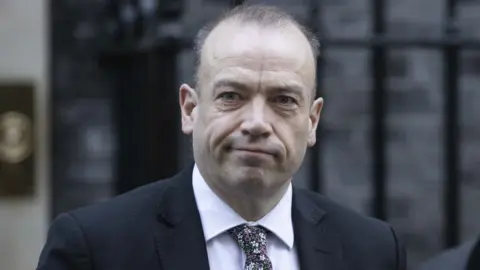Stormont budget: Education Department told to make cuts to spending
 Anadolu Agency/Getty Images
Anadolu Agency/Getty ImagesStormont's Department of Education needs to make significant cuts to its "current spending trajectory", the NI secretary has said.
Chris Heaton-Harris set out a budget for departments in a written statement to the House of Commons on Thursday.
Departments have been operating without proper budgets since the start of the financial year in April.
They had been on course to overspend by £660m this financial year, equivalent to almost 5% of the budget.
However, it has emerged that has been reduced to about £330m after work by the Northern Ireland Civil Service and the Northern Ireland Office.
BBC News NI understands an overspend will ultimately be avoided by the Treasury allowing Stormont to take an advance on next year's block grant.
Stormont was due to get an extra £360m next year as a result of extra spending in the Autumn Statement.
Getting to £330m from an earlier forecast overspend of £660m will still require difficult decisions in some departments.
The Department of Health said it was "urgently assessing the implications" of the budget announcement.
"As part of this process, we will need to examine the potential implications for next year's budget, which was already projected to be significantly constrained," a spokesperson added.
The executive had not agreed a budget when the DUP withdrew from the first minister's role in February in protest at the Northern Ireland Protocol.
An independent watchdog has previously said the lack of a budget had contributed to a significant potential overspend.
'Affront to democracy'
Dr Andrew McCormick, a former senior civil servant at Stormont, described the budget plans as "an affront to democracy".
He told the BBC's The View it was better to have a budget than not, but added "there are so many things that are wrong with this process it's hard to know where to start".

"We have a situation where decisions that are inherently political, decisions about how public money is used, the responsibility being transferred to permanent secretaries, who will do their best, they're not afraid of taking hard decisions," he continued.
"But that's not their role in a constitution, this is an affront to democracy. It has no democratic legitimacy."
'Revenue-raising and reviews'
Mr Heaton-Harris said although education would receive a cash increase of £286m compared to last year's baseline, the department would need to take action to live within its budget.
"This will affect funding for high-spend areas such as the Education Authority's block grant and the aggregated schools budget," the secretary of state explained.
"As some costs are demand driven, this will have impacts.
"However, these are unavoidable given the scale of the overspend risk facing the department.
"The required action to curtail expenditure must be taken by all education spending areas in order to live within budget."
Allow X content?
Mr Heaton-Harris warned if an executive did not return to set the 2023-24 budget then additional revenue raising was a possibility - that would mean things such as water charges.
"In the absence of an executive, the government's priorities for next year's budget will be to deliver a fair outcome for all taxpayers and citizens in Northern Ireland," he said.
"We will work to put Northern Ireland's finances on a sustainable long-term footing. That means we will need to consider wide-ranging options for revenue-raising and review all spending."
Dr Patrick Roach, general secretary of the NASUWT teaching union, said education in Northern Ireland was already in a state of crisis and if the sector is not protected "we can expect to see increased class sizes".
Gerry Murphy, from the Irish National Teachers' Organisation, said the announcement was "a further slap in the face for teachers, school leaders and their co-workers all of whom managed to keep the education service functioning in the face of the Covid pandemic".
 Reuters
ReutersDepartments had initially been able to operate without a formal budget because of what is known as the vote on account.
It is a legal mechanism which allows the spending of money in the first few months of a financial year before full budget legislation is passed.
It authorises spending equal to 45% of the allocation for the previous year.
In August, that 45% limit was being approached so a senior civil servant took control of Stormont's finances.
Neil Gibson, the senior official at the Department of Finance, has been using emergency powers to release cash to departments.
Section 59 of the Northern Ireland Act allows Mr Gibson to use money, equivalent to up to 95% of last year's budget "for such services and purposes" as he directs.
If a Northern Ireland budget was not passed at Westminster, Mr Gibson would ultimately have to impose in-year cuts of least 5% across the public service.
The independent Fiscal Council said the Stormont overspend was mostly due to the unavoidable impact of inflation and pay pressures.
However, spending control arrangements in the absence of ministers seem to be making the situation worse, it added.
Earlier this month, the Northern Ireland secretary said the findings of the fiscal council were alarming and he would be working with the Northern Ireland Civil Service to "work through the next steps needed on the NI budget".
